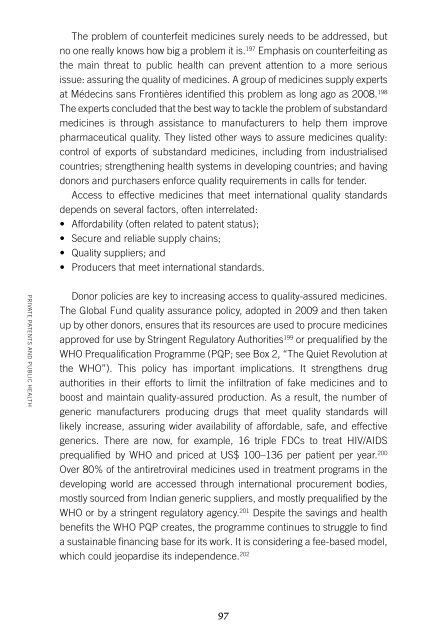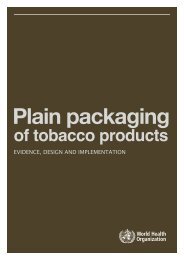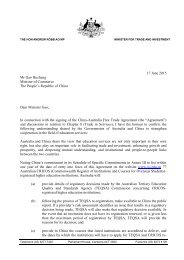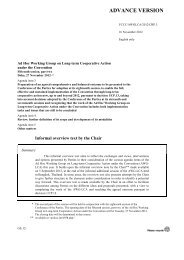PRIVATE PATENTS AND PUBLIC HEALTH
private-patents-and-public-health
private-patents-and-public-health
Create successful ePaper yourself
Turn your PDF publications into a flip-book with our unique Google optimized e-Paper software.
The problem of counterfeit medicines surely needs to be addressed, but<br />
no one really knows how big a problem it is. 197 Emphasis on counterfeiting as<br />
the main threat to public health can prevent attention to a more serious<br />
issue: assuring the quality of medicines. A group of medicines supply experts<br />
at Médecins sans Frontières identified this problem as long ago as 2008. 198<br />
The experts concluded that the best way to tackle the problem of substandard<br />
medicines is through assistance to manufacturers to help them improve<br />
pharmaceutical quality. They listed other ways to assure medicines quality:<br />
control of exports of substandard medicines, including from industrialised<br />
countries; strengthening health systems in developing countries; and having<br />
donors and purchasers enforce quality requirements in calls for tender.<br />
Access to effective medicines that meet international quality standards<br />
depends on several factors, often interrelated:<br />
• Affordability (often related to patent status);<br />
• Secure and reliable supply chains;<br />
• Quality suppliers; and<br />
• Producers that meet international standards.<br />
<strong>PRIVATE</strong> <strong>PATENTS</strong> <strong>AND</strong> <strong>PUBLIC</strong> <strong>HEALTH</strong><br />
Donor policies are key to increasing access to quality-assured medicines.<br />
The Global Fund quality assurance policy, adopted in 2009 and then taken<br />
up by other donors, ensures that its resources are used to procure medicines<br />
approved for use by Stringent Regulatory Authorities 199 or prequalified by the<br />
WHO Prequalification Programme (PQP; see Box 2, “The Quiet Revolution at<br />
the WHO”). This policy has important implications. It strengthens drug<br />
authorities in their efforts to limit the infiltration of fake medicines and to<br />
boost and maintain quality-assured production. As a result, the number of<br />
generic manufacturers producing drugs that meet quality standards will<br />
likely increase, assuring wider availability of affordable, safe, and effective<br />
generics. There are now, for example, 16 triple FDCs to treat HIV/AIDS<br />
prequalified by WHO and priced at US$ 100–136 per patient per year. 200<br />
Over 80% of the antiretroviral medicines used in treatment programs in the<br />
developing world are accessed through international procurement bodies,<br />
mostly sourced from Indian generic suppliers, and mostly prequalified by the<br />
WHO or by a stringent regulatory agency. 201 Despite the savings and health<br />
benefits the WHO PQP creates, the programme continues to struggle to find<br />
a sustainable financing base for its work. It is considering a fee-based model,<br />
which could jeopardise its independence. 202<br />
97






